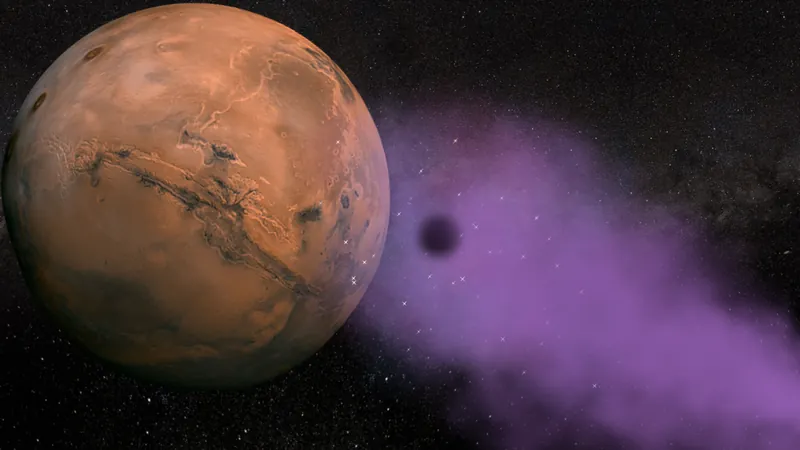
Could Black Hole "Bullets" Help Unlock the Secrets of Dark Matter?
2024-09-20
Author: Wai
Hypothesis of Primordial Black Holes
Scientists have recently proposed a fascinating hypothesis: primordial black holes, traveling at astonishing speeds exceeding 7,000 times the speed of sound, might be zipping through our solar system and causing subtle wobbles in Mars' orbit. These tiny, almost unimaginably small black holes could ultimately hold the key to unraveling one of the greatest mysteries in modern astrophysics: the enigmatic nature of dark matter.
What are Primordial Black Holes?
Primordial black holes are theorized to have originated just moments after the Big Bang, standing in stark contrast to the much larger, more commonly known astrophysical black holes like Sagittarius A*, which lies at the center of our Milky Way galaxy and boasts a mass 4.3 million times that of our Sun. In contrast, primordial black holes are speculated to be no larger than asteroids, possibly even smaller than atoms, yet they could be crucial players in the dark matter puzzle.
Understanding Dark Matter
Dark matter, which is believed to make up about 85% of the universe's total mass, does not interact with light in the way ordinary matter does. This renders it invisible, detectable only through its gravitational effects on visible matter, radiation, and the universe's large-scale structure. Because all matter we can observe, from planets to stars, accounts for a mere fraction (less than 20%) of the universe, understanding dark matter is critical for advancing our grasp of the cosmos.
Debate over Dark Matter Composition
The debate over the composition of dark matter has escalated, with some researchers suggesting that primordial black holes could actually be responsible for it. While many have sought elusive particles that could represent dark matter, advancements in technology and ongoing searches have largely turned up empty. This has paved the way for renewed interest in an idea first hypothesized over four decades ago: that dark matter might not consist of particles at all, but of these primordial black holes.
Research Focus on Mars
To test this hypothesis, a team of physicists has turned their sights to Mars. They theorize that if primordial black holes indeed comprise dark matter, they should pass through our solar system roughly once a decade. Such encounters could lead to small, detectable changes in Mars' orbit, changes that modern technology should be able to monitor.
Precision in Measurement
David Kaiser, a member of the research team from the Massachusetts Institute of Technology, noted that scientists have tracked the distance between Earth and Mars with remarkable precision—accurate to within about 10 centimeters (3.9 inches). He highlighted the importance of this accuracy in their search for subtle gravitational effects.
Simulation Results
The scientists conducted simulations to estimate how frequently these primordial black holes might pass through the solar system. The results indicated that Mars may be a more fruitful target than Earth or the Moon for detecting potential wobbles caused by passing black holes. If these small black holes approach Mars within a few hundred million miles—a distance that seems vast yet is tiny in cosmic terms—they could induce minor deviations in the Red Planet’s orbit.
Challenges in Detection
Importantly, detecting such a wobble in Mars’ motion would not conclusively establish its cause. Scientists will need to differentiate between the effects of a primordial black hole and other phenomena, like the gravitational influence of passing asteroids of similar mass. Kaiser emphasized that understanding these backgrounds is crucial for an accurate interpretation of any anomalies that might emerge.
Future Prospects
As researchers continue to refine their techniques for observing these cosmic interactions, the potential discovery of primordial black holes would not only validate their existence but also radically enhance our understanding of dark matter and the universe itself. Encouragingly, astrophysicists like Matt Caplan express optimism about the endeavor, suggesting that such a quest could finally lead us closer to unmasking the elusive shadow that dark matter casts over our understanding of the cosmos.
Conclusion
In conclusion, as we keep our eyes on the heavens, the possibility remains that black hole "bullets" may soon illuminate the profound mysteries surrounding this dark, unseen component of the universe. Stay tuned as scientists venture further into this cosmic endeavor!

 Brasil (PT)
Brasil (PT)
 Canada (EN)
Canada (EN)
 Chile (ES)
Chile (ES)
 Česko (CS)
Česko (CS)
 대한민국 (KO)
대한민국 (KO)
 España (ES)
España (ES)
 France (FR)
France (FR)
 Hong Kong (EN)
Hong Kong (EN)
 Italia (IT)
Italia (IT)
 日本 (JA)
日本 (JA)
 Magyarország (HU)
Magyarország (HU)
 Norge (NO)
Norge (NO)
 Polska (PL)
Polska (PL)
 Schweiz (DE)
Schweiz (DE)
 Singapore (EN)
Singapore (EN)
 Sverige (SV)
Sverige (SV)
 Suomi (FI)
Suomi (FI)
 Türkiye (TR)
Türkiye (TR)
 الإمارات العربية المتحدة (AR)
الإمارات العربية المتحدة (AR)